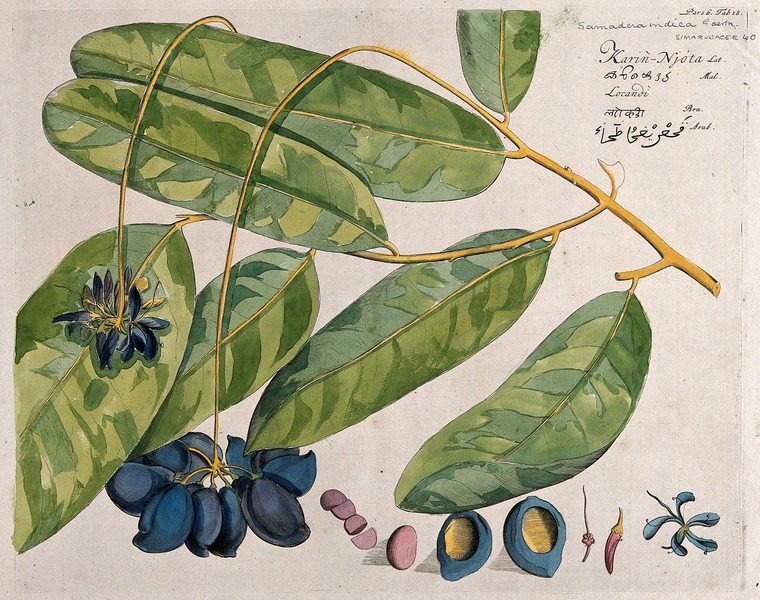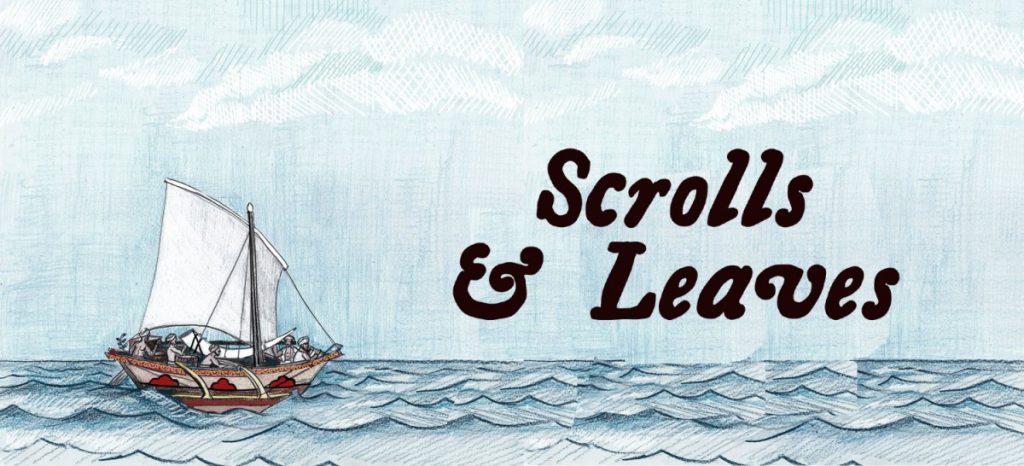Tropical plants have driven exploration, started wars, transformed economies. Hear the stories in episode 2 of the new Scrolls & Leaves podcast.

A decoction of Quassia indica leaves, commonly known as Niepa Bark Tree, is used to treat digestive problems and as an insecticide. Illustration from the ‘Hortus Malabaricus’, 1686. Image: @ExploreWellcome
Faced with COVID-19, for which there are no specific treatments, people have scrambled to find herbal remedies to protect themselves.
Plant-based medicine companies have spotted the opportunity. In June, Baba Ramdev, yoga guru and the owner of Pantanjali Ltd., claimed without evidence that an herbal medicine named ‘Coronil’ could cure COVID-19. In Afghanistan, an herbalist was caught mixing opiates with plants and selling that to people. There’s been a run on “immunity boosting” foods, techniques and supplements around the world.
Understandably, all this can make one wary of alternative remedies. But in episode 2 of Scrolls & Leaves, ‘Healing Plants’, we search for an alternative – and hopefully, less conflicting – narrative about plants as medicine. Scrolls & Leaves is an immersive-sound history podcast, and season 1, entitled ‘Trade Winds’, focuses on how trade across the Indian Ocean over the past 2,000 years changed our world.
We know plants are healers, of course. But they’re also so much more. They have shaped our history. Just a few centuries ago, they drove exploration, started wars, transformed economies. Today, they are the bedrock of Big Pharma and traditional medicine empires like Patanjali Ayurved.
The episode begins with a murder on the Karakoram Pass, and a hunt for the killer that yields an ancient pocketbook that belonged to a Buddhist monk. The book has recipes for medicines – including one for boosting intelligence and memory (04:52).
We then go briefly to Europe for a royal wedding, and then travel back with the explorer Vasco da Gama (did you know an Arab Omani sailor was piloting his ship?) to the Malabar coast, fabled home to spices – and maybe even a unicorn? (13:00)
In India, Europeans jostle to learn about medicinal plants featured in its rich folk and traditional medical systems. Soon, they set up a global supply chain to transport valuable plants back to Europe. The medicinal knowledge taken from the tropics is written into journals by the Royal Society, which is Britain’s national academy of sciences (26:00).

And finally, with advances in chemistry, Europeans learn to extract the active compounds from plants, and start making pills (29:30). The new way of doing science revolutionises medicine, and ‘modern establishment medicine’ supplants traditional medical systems as the go-to in most places around the world, according to Dominik Wujastyk, an Ayurveda scholar at the University of Alberta, Canada.
Like in episode 1, ‘Pandemics & Borders’, this episode hints at cultural and knowledge appropriation, as well as the connections between science and empire.
We can’t fault the modern life-saving drugs that Western medicine has given us. But we wonder if something effervescent doesn’t get lost when plants become pills? Perhaps the traditional and holistic healing framework that medicinal plants once belonged to?
The first two episodes of Scrolls & Leaves are supported by India BioScience, DBT/Wellcome Trust India Alliance and Deepa Agashe at NCBS.
Article Credit: thewire.in
